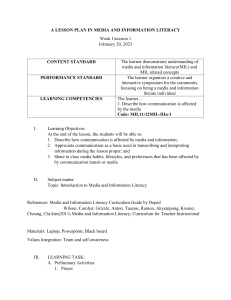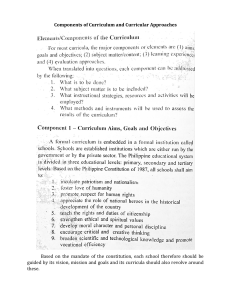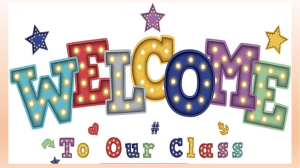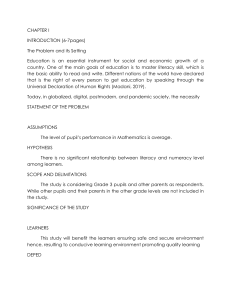Uploaded by
HERRA THESA BANAAG
Grade 12 Media Literacy Lesson Plan: Communication & Media
advertisement
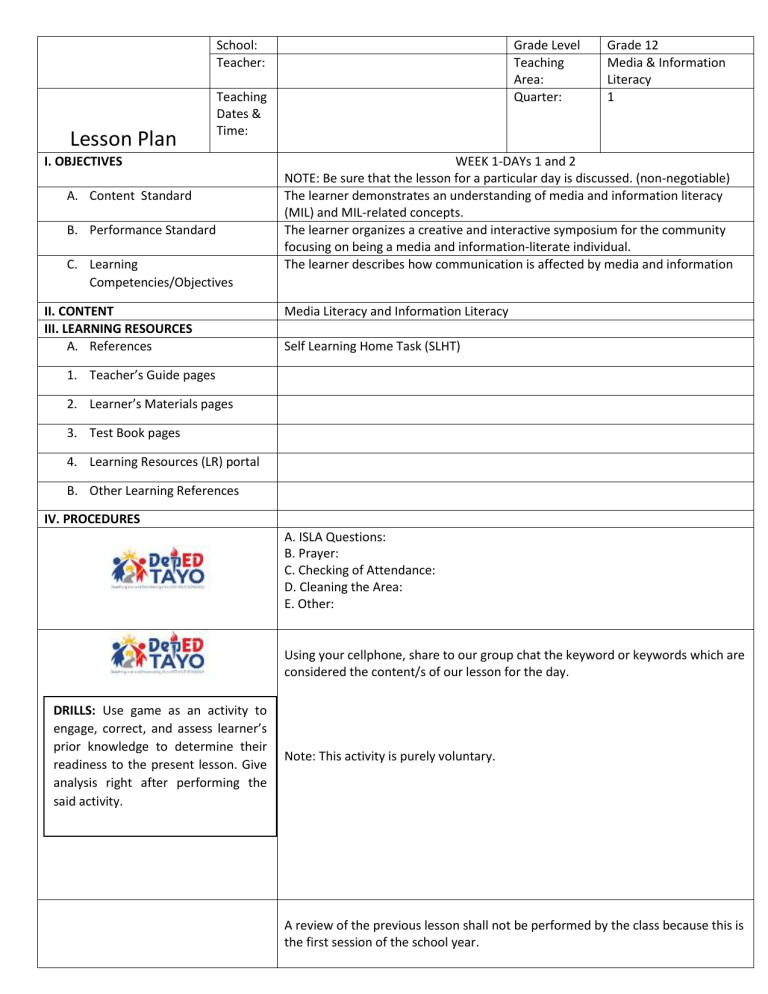
School: Teacher: Lesson Plan Grade Level Teaching Area: Quarter: Teaching Dates & Time: I. OBJECTIVES A. Content Standard B. Performance Standard C. Learning Competencies/Objectives II. CONTENT III. LEARNING RESOURCES A. References Grade 12 Media & Information Literacy 1 WEEK 1-DAYs 1 and 2 NOTE: Be sure that the lesson for a particular day is discussed. (non-negotiable) The learner demonstrates an understanding of media and information literacy (MIL) and MIL-related concepts. The learner organizes a creative and interactive symposium for the community focusing on being a media and information-literate individual. The learner describes how communication is affected by media and information Media Literacy and Information Literacy Self Learning Home Task (SLHT) 1. Teacher’s Guide pages 2. Learner’s Materials pages 3. Test Book pages 4. Learning Resources (LR) portal B. Other Learning References IV. PROCEDURES A. ISLA Questions: B. Prayer: C. Checking of Attendance: D. Cleaning the Area: E. Other: Using your cellphone, share to our group chat the keyword or keywords which are considered the content/s of our lesson for the day. DRILLS: Use game as an activity to engage, correct, and assess learner’s prior knowledge to determine their readiness to the present lesson. Give analysis right after performing the said activity. Note: This activity is purely voluntary. A review of the previous lesson shall not be performed by the class because this is the first session of the school year. REVIEW: The Teacher will ask 3 to 5 relevant questions leading to the topics to be discussed. The teacher shall ask the following questions: Have you participated in a community activity in relation to the Anti-Fake News Activity? MOTIVATION: It is the teacher’s priming that will hook engage student’s interest to focus by giving essential and relevant, situations to activate the prior knowledge leading to the presentation of new lesson. Is it good advocacy? Vocabulary: Directions. Engage in reading the terms and its meanings Please read each word or keyword @ https://sites.google.com/deped.gov.ph/mil/slhts/q1week1 Read this article: LESSON PROPER: Teacher’s input or abstraction to deliver and present the concepts of the lesson in a systematic manner. Provoke thinking of students by asking relevant questions to gauge student’s understanding of the lesson/s. Communication is affected by media and information By George P. Lumayag Since social media dashboards have been the main platforms to communicate family members, relatives, friends, and other people and to monitor and update news about real facts, people were affected by media and information as the only way to know what was happening around the world due to the impossibility to know such information in another way. Read More… Activity: Now, read more on the learning materials published @ https://sites.google.com/deped.gov.ph/mil/slhts/q1-week1 . Use a phone... 1. Are you affected by media and information? 2. What specific information affects your lifestyle? 3. Describe the information stated in the reading material. PRACTICE EXERCISES: The teacher will provide practice exercises that will be answered by the students in pairs or in group or in individual performance in the new normal. GENERALIZATION: The teacher will give questions to draw out or elicit from the students what is expected to generalize about concepts and or demonstrate steps in solving problems. Analysis: 1. Based on the presented article, how do users examine and validate the shared information? Note: The students shall individually answer the question. Abstraction: According to Butch Hernandez (2017) inquirerdotnet stated that “Isolating what is true is such a challenge these days. We now live in a world where “alternative facts” and fake news are lavishly circulated by an army of strident online trolls. It is ironic that the technology that enables us to instantaneously access tremendous amounts of media content also severely hampers our ability to separate fact from fiction.” Hernandez also added that we need to develop a larger set of literacy skills which would help us to analyze the messages we receive and utilize media as tools to communicate our own ideas to other people. We must be literate and critical thinkers to empower us to make decisions pertaining to information, communications, and media technology. We must be meticulous in reading infographics, and webpages, and viewing video clips. And we must be careful when sharing them with the reading and viewing public. Note: The students shall sum-up the concepts orally. Applications: Exercise 1: Day 1 APPLICATIONS: The teacher will give questions on application to ensure that the lessons were understood and skills were being acquired. Ask real life situations if possible to develop appreciation of students. Essay. Directions. Based on the opinionated article, describe how communication is affected by media and information. Write your answer on the short-size bond paper or an intermediate paper. Browse the criteria @ https://sites.google.com/deped.gov.ph/mil/slhts/q1-week1 Assessment: Please answer the 1-10 item assessment @ https://sites.google.com/deped.gov.ph/mil/slhts/q1-week1 QUIZ: The teacher will give a pen paper test to verify and ensure students’ mastery of the lesson. Assignment is optional ASSIGNMENT: The teacher will give 1 or 2 easy, 1 or 2 average, and 1 difficult activities to be done at home to strengthen the students assessment. GUIDE QUESTIONS FOR REFLECTIONS REFLECTION: The teacher needs to reflect what went well and what went wrong to improve teacher’s and students’ performance. How many students didn’t find difficulties in answering their lesson? How many students find the lesson interesting, engaging, and enjoyable? What is lacking in the lesson? (Prior knowledge, skills needed, or interest to listen and pay attention). How many students were trying to cope up despite the same difficulties encountered in the delivery of the lesson? How many students mastered the lesson despite the limited resources facilitated the teaching and learning process? How many students finished their work on time, and how many of them did not finish their work on time? Why? Number of learners who earned 80% in the evaluation. Number of learners who earned 80% above. Number of learners who need additional activities and require for remediation. What went well? (Ex. I planned well what strategy fits my students, and the lesson as well to be discussed the reason why 90% of them acquired the skills needed to use and perform.) What do I need to improve in my teaching performance and students’ performance? (Ex. I have to employ a variety of strategies that fits to my students and sustain my energy to execute another lesson.)
